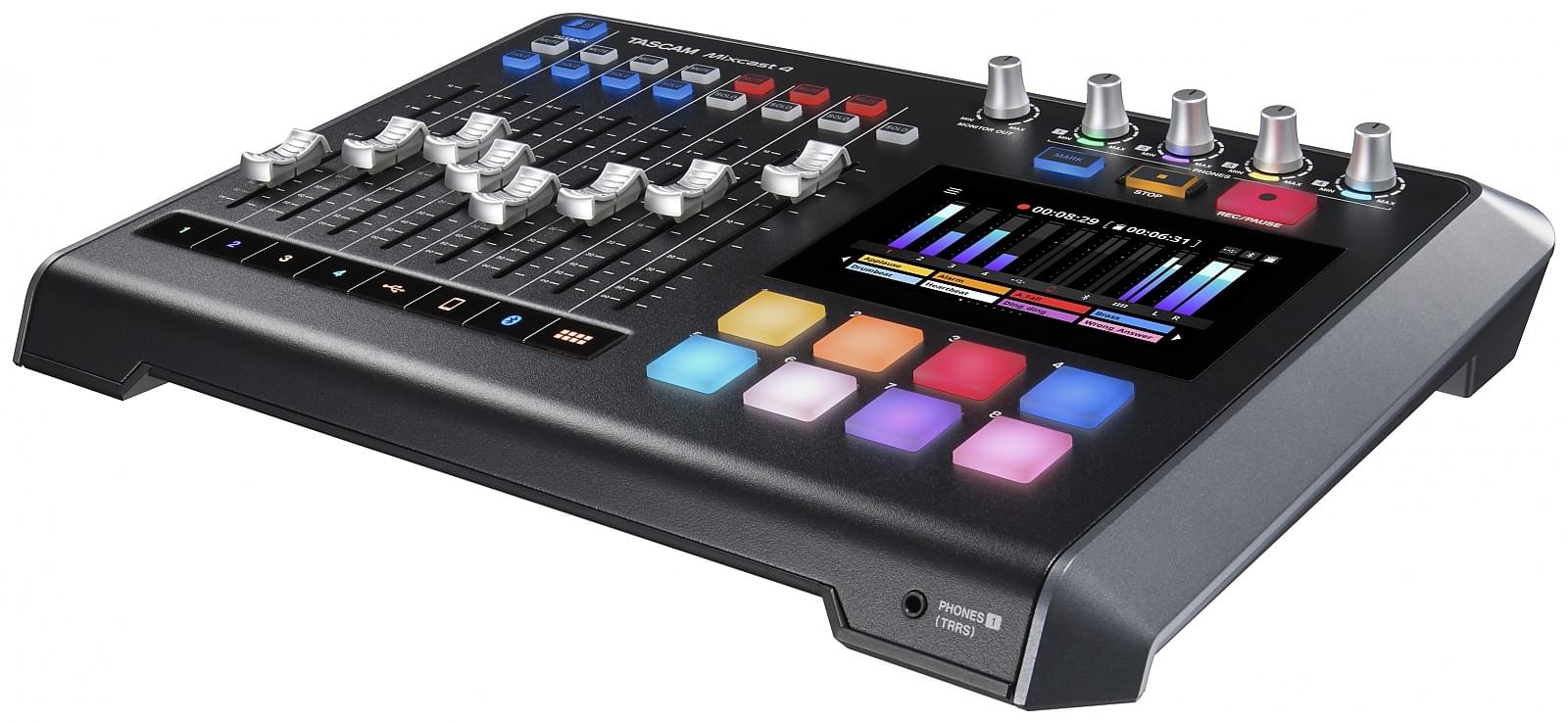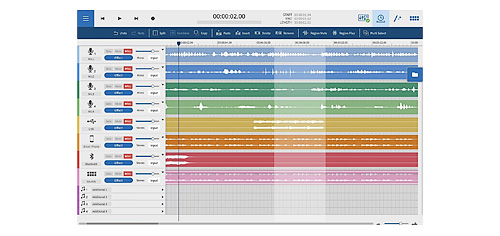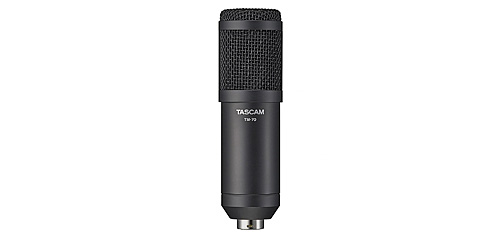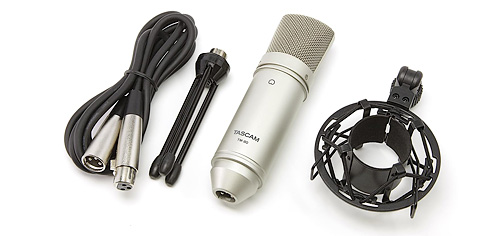Mixcast 4
Content Production Station

All you need for successful
Podcast Creation
Audio creation made easy
Mixcast 4 makes professional content creation easy. For podcast creation, live streaming,
event production or voice over, Mixcast 4 can mix and record mic input with internal
background music, effect sounds and jingles via the trigger pads, and external audio input
from your phone, PC or Bluetooth device.
Together with the Tascam Podcast Editor software you get a complete package including waveform editing and multi-track recording for all work steps from pre-production to completion.
Stress-free touch panel control
Equipped with four mic inputs and four individual headphones outputs, the Mixcast 4 is always
ready for podcast production without complicated settings. It provides all audio-related
operation and workflow needed for live-streaming, events, podcasts, and other applications.
The auto-mixing function, for example, can automatically adjust optimal levels and set mic
priority for a perfect mix.
And thanks to the 5-inch colour touch screen, you can intuitively access the well-structured menu and make the desired settings with just a few simple steps.
A complete workstation with all the functions you need
From audio recording to the mixing of recorded audio, the Mixcast 4 offers a complete production environment with multiple convenient functions such as 14-track recording direct to the unit’s SD card, Bluetooth audio input, an Aux input connector to easily mix and record phone conversations (with mix-minus) or other sound sources, and USB connectivity that allows the unit to add sounds from a computer.
You can even use Mixcast 4 as a 14-in/2-out USB audio interface with your favourite DAW
software.
Enhance content with real-time sound effects
The Mixcast 4 comes with eight banks of fully customisable, illuminated sound pads which can
be triggered during a podcast production or live broadcast. In addition to preset sound
effects, users can flexibly assign new sounds, music or even mic sounds that have been
pre-recorded on the unit.
The Mixcast 4 sound pads also allow for easy and on-time voice effects such as pitch transformation, reverb and more to make live streams and recordings even more interesting and fun.
Tascam Podcast Editor available for post-editing and control
The Tascam Podcast Editor offers simple and practical editing of audio content, track arming,
as well as easy configuration and assignment of sound effects and background music to the
sound pads.
There’s no need for expert knowledge on DAW software as Podcast Editor also offers intuitive graphics that will help users record audio easily using the Mixcast 4. Tascam Podcast Editor is designed specifically for Mixcast 4 and is available for both computers and mobile devices.
Videos
Tutorials
Getting started
Video tutorial on how to get started with the Mixcast 4
How to include guests
Video tutorial on how to include callers and online guests in your podcasts
Using the sound pads
Video tutorial on how to use the sound pads
Using the built-in effects
Video tutorial on how to use real-time and advanced effects
Recording to Podcast Editor
Video tutorial on how to record using the Podcast Editor application.
What’s new in v1.20? NEW
Explanation of the new features introduced with firmware version 1.20
Features at a glance
- Production of podcasts with up to four people: 4 mic inputs with auto-mix, 4 headphones outputs
- Invite guests and friends: Mix-Minus to include call-ins with echo-free audio via Bluetooth, USB input or 4-pole TRRS audio cable
- Sound pads for instant sound triggering and effects
- Easy and intuitive control using a 5-inch touchscreen
- Fully compatible with the dedicated Tascam Podcast Editor software to cover the entire production workflow
- Records up to 14 tracks directly to an SD card (12 channels + stereo mix)
- Built-in USB audio interface with 14 inputs and two outputs
- Nine language options including English, French, German, Italian, Spanish, Russian, Chinese, Japanese and Korean
Hardware
- Four mic inputs over balanced XLR/TRS combo jacks
- Four headphones outputs with independent volume controls
- Headset input/output via 3.5-mm TRRS mini-jack (mirrors the output of headphones output 1)
- Stereo line input, selectable between dual balanced TRS jacks and a 3.5-mm TRRS jack
- Balanced monitor outputs via dual TRS jacks
- Stereo line output via 3.5-mm stereo mini-jack
- Eight Sound Pad buttons
- Use these to instantly play effect sounds, jingles, background music or other audio material
- Eight sound banks available for up to 64 sounds in total
- Quickly switch between the eight sound banks via the touchscreen
- One bank of sounds included (can be set with Podcast Editor)
- Eight large channel faders to mix the levels of
- four mic signals
- one stereo signal via USB
- one stereo signal from a mobile device
- one stereo signal via Bluetooth
- the Sound Pad sounds
- Mute and Solo buttons on each channel (sound pad channel: Solo only)
- Talkback button for announcements to the podcast participants
- Mark button to set marks for specific events or phases of the podcast during recording
- Powered by low-noise DC 12 V (AC adapter with screw lock included as standard)
Software settings and processing
- Mic channels:
- Selection between Condenser (with 48 V phantom power) and Dynamic
- Easy sound settings (Deep, Mid, Bright) or manual setting (two-band semi-parametric EQ), switchable on/off
- Easy compressor settings (Soft, Hard) or manual setting with five parameters, switchable on/off
- De-esser (three parameters) and noise supressor (five parameters)
- Reverb (one mic channel only) with easy settings (Small, Medium, Large) or manual setting (five room types, three parameters), switchable on/off
- USB, smartphone, Bluetooth stereo channels:
- De-esser (three parameters) and noise supressor (five parameters)
- Easy audio enhancement settings (Talk, Music, Off)
- Feature to play back, check, rename or delete recorded audio files
- Sound pads:
- Select from six different methods of how sound pad sounds are played
- Record sound pad sounds
- Audio settings:
- USB Mix-Minus on/off
- Feedback prevention on/off
- Line level output on/off
- Solo mode pre/after fader
- Display brightness, Auto power-off
- Adjustable time delay for the USB output signal to compensate for any time delay between the unit’s audio and video signals played from a computer (0–2000 ms)
- SD cards can be erased (quick or full erase) and used as a mass-storage device via USB
- Bundled with dedicated TASCAM Podcast Editor application to cover the entire system workflow
- Load audio files into Mixcast 4 to use them for the Sound Pads
- Load recorded Podcasts from Mixcast 4 for editing and archiving
- Record multiple audio tracks with your computer or mobile device
New features since firmware v1.20
- A new Common Mode enables a mic input effect to be shared by multiple mic channels
- Effects can now be turned on/off for individual mics on the home screen
- The ducking effect can now also be used with pad playback sounds
- The input level for the USB, smartphone and Bluetooth inputs can now be adjusted
- Modified operation of the feedback prevention function
- Switchable decibel scale for the level meters
- Tapping on a channel on the main page calls up the corresponding settings page
New features since firmware version 1.30
- Improvements for sound pads
- Sound pad banks can now be changed and used during recording
- The playback volume can now be adjusted for each sound pad separately
- Sounds assigned to sound pads can now be normalised
- The volume of the Bleep sound can now be adjusted
- The talkback sound can now also be sent to USB, smartphone and Bluetooth connections
Supported Operating Systems
Windows
- Windows 11 (version 24H2)
- Windows 11 (version 23H2)
- Windows 11 (version 22H2)
- Windows 11 (version 22H1)
- Windows 10 (version 22H2)
- Windows 10 (November 2021, version 21H2)
- Windows 10 (May 2021, version 21H1)
Mac
- macOS Sequoia (15)
- macOS Sonoma (14.0)
- macOS Ventura (13.0)
- macOS Monterey (12.0)
- macOS Big Sur (11.0)
- macOS Catalina (10.15)
iOS
- iOS 18 / iPadOS 18
- iOS 17 / iPadOS 17
- iOS 16 / iPadOS 16
- iOS 15 / iPadOS 15
- iOS 14 / iPadOS 14
- iOS 13 / iPadOS 13
Specifications
| Recorder specifications | |
|---|---|
| Recording media | SD cards (64 MB – 2 GB) SDHC cards (4–32 GB) SDXC cards (48–512 GB) |
| Recording/playback format | WAV, 48 kHz, 24 bit, 2-channel stereo / 14-channel poly (BWF) |
| Approximate recording times with 16-GB SD card (in hours:minutes) | |
| Stereo recording | 16:30 |
| 14-track recording | 2:20 |
| Analogue audio inputs | |
|---|---|
| Mic inputs 1-4 | XLR/TRS combo jacks XLR-3-31 (1: GND, 2: HOT, 3: COLD) 6.3-mm standard TRS jacks (Tip: HOT, Ring: COLD, Sleeve: GND) |
| Maximum input level | +10 dBu (when LEVEL at min.) |
| Nominal input level | −10 dBu (when LEVEL at min.) |
| Minimum input level | −76.5 dBu (when LEVEL at max.) |
| Gain range | 66.5 dB |
| Input impedance | 2.1 kΩ |
| Headset input (TRRS, CTIA standard) | 3.5-mm, 4-pole mini jack |
| Maximum input level | +4 dBV (when LEVEL at min.) |
| Nominal input level | −16 dBV (when LEVEL at min.) |
| Minimum input level | −82.5 dBV (when LEVEL at max.) |
| Gain range | 66.5 dB |
| Input impedance | 2 kΩ |
| Line input (TRRS, CTIA standard) | 3.5-mm, 4-pole mini jack |
| Maximum input level | +8 dBV |
| Nominal input level | −12 dBV |
| Input impedance | 12 kΩ |
| Line inputs L/R (balanced) | 6.3-mm standard TRS jacks (Tip: HOT, Ring: COLD, Sleeve: GND) |
| Maximum input level | +24 dBu |
| Nominal input level | +4 dBu |
| Input impedance | 11 kΩ |
| Analogue audio outputs | |
|---|---|
| Phones outputs 1-4 | 6.3-mm standard stereo jacks |
| Maximum output power | 45 mW + 45 mW (0.1% THD+N or less, 32 Ω) |
| Working impedance | 16–600 Ω |
| Headset output (TRRS) | 3.5-mm, 4-pole mini jack (signal mirrors Phones 1 output) |
| Line output (TRRS, CTIA standard) | 3.5-mm, 4-pole mini jack |
| Maximum output level | −25 dBu |
| Nominal output level | −45 dBu |
| Output impedance | 100 Ω |
| Monitor output L/R (balanced) | 6.3-mm standard TRS jacks (Tip: HOT, Ring: COLD, Sleeve: GND) |
| Maximum output level | +20 dBu |
| Nominal output level | 0 dBu |
| Output impedance | 200 Ω |
| Line output | 3.5-mm stereo mini jack |
| Maximum output level | +6 dBV |
| Nominal output level | −14 dBV |
| Output impedance | 200 Ω |
| USB port | |
|---|---|
| Connector | USB Type-C |
| Transfer format | USB 2.0 High Speed |
| Device class | USB Mass Storage Class USB Audio Class 2.0 |
| USB audio | Sampling rate: 48 kHz Bit depth: 24 bit Inputs: 14 channels (output from Mixcast 4) Outputs: 2 channels (input to Mixcast 4) |
| Audio performance | |
|---|---|
| Equivalent input noise, mic inputs | ≤−125 dBu (150 Ω termination, LEVEL at max.) |
| Frequency response (mic inputs 1–4) | 20 Hz – 20 kHz: ±0.3 dB (JEITA) |
| S/N ratio (mic inputs 1–4) | 101 dB (channel faders at 0, 20 kHz SPCL LPF, A-weighted) |
| Distortion (mic inputs 1–4) | 0.003 % (1 kHz sine wave, channel faders at 0, 20 kHz SPCL LPF) |
| Crosstalk | ≥95 dB |
| Note: Measurement conditions conform to JEITA CP-2905B. |
| Bluetooth | |
|---|---|
| Output class | Class 2 (approx. 10 m* unobstructed transmission distance) |
| Supported profile | A2DP |
| Supported A2DP codecs | SBC, AAC |
| Supported A2DP content protection | SCMS-T |
| Computer hardware requirements | |
|---|---|
| Windows | Windows computer with a USB port (2.0 or higher) |
| CPU/processor speed | 2 GHz or faster dual core processor (x86), operation using the Tascam driver with ARM64 CPUs not guaranteed |
| Memory | 2 GB or more |
| Mac | Mac computer with a USB port (2.0 or higher) |
| CPU/processor speed | 2 GHz or faster dual core processor (operation confirmed with Intel and Apple Silicon M1 or M2) |
| Memory | 2 GB or more |
| Power supply and other specifications | |
|---|---|
| Power supply | Dedicated AC adapter (PS-P1220E NUT), DC 12 V |
| Power consumption | 12.5 W (maximum) |
| Weight | 2.55 kg |
| Permissible operating temperature range | 0–40 °C |
| Dimensions (W × H × D) | 375 mm × 57 mm × 264 mm (excluding protrusions) 375 mm × 71 mm × 267 mm (overall) |
Design and specifications subject to change without notice.
Page last modified: 2024-12-18 13:10:55 UTC










